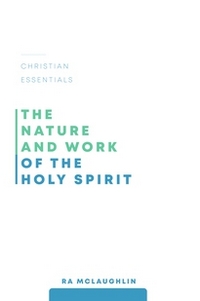 The Nature and Work of the Holy Spirit
The Nature and Work of the Holy Spirit
DETAILS: Series: Christian Essentials Publisher: P & R Publishing Publication Date: April 26, 2022 Format: Paperback Length: 153 pg. Read Date: January 29, 2023

What’s The Nature and Work of the Holy Spirit About?
As I said about the second volume of the Christian Essentials series, one of its advantages is that I can largely recycle what I said about the others.
This is a basic and broad introduction to Pneumatology—the doctrine of the Holy Spirit from a broadly Evangelical perspective. There’s a good mix of foundational theology and application of it to the Church and the individual believer. The book is adapted from curriculum using language that’s easy to translate—particularly into languages that don’t have a well-developed theological vocabulary—so the English is kept basic, too. There’s almost no academic or technical theological language used, and those that are used are well-defined (including in a handy glossary).
The chapters are short (most around fifteen pages) and well-organized. Each contains a handful of side-bars consisting of a paragraph or two with the contents of interviews with pastors and theologians on the topic under discussion. These interviews were with people from a variety of theological perspectives helping broaden the text so that it’s not exclusively from a reformed perspective.
The Organization of the Work
One thing that really jumped out at me while reading this book is that it wasn’t organized the same way as similar works are—which is refreshing because you get tired after a while of reading remixes on a topic. But mostly refreshing because I thought this was a really good way to approach the subject.
We start with the role of—and revelation of—the Spirit as a member of the Trinity—as seen in the Old Testament, then the New, and then as it was worked out in Church History. Those are three quick chapters that should probably be longer but did the job for the scope of this book.
Then we get chapters dealing with the Spirit’s work in the world—providence, creation, revelation, and common grace. Followed by His work in the Church—through special revelation, covenant grace, and gifts. The last two chapters focus on His work in individual believers—in conversion and sanctification.
So, what did I think about The Nature and Work of the Holy Spirit?
Solid teaching, an effective and helpful organization, all in all, a good book.
Like the rest of this series—the big problem with this book is that it works so hard to not take a particular position that it gives a watered-down presentation on areas of controversy. If they’d only taken a firm stance on (for example) cessationism, and then went on to give a fair presentation of non-cessationist views, that’d be different. Instead, we’re given descriptions of the views written in a way to explain them, but with the aim to avoid particulars and the offense they may carry—and really leads to it being almost useless.
When it’s not discussing intra-mural debates or disagreements, it’s a very useful and helpful work (like the other two books in this series). It’s good on the essentials—although exactly how “essential” is defined might be quibbled with.
For the series, I think this might have been the strongest entry. For just an introduction to the doctrine of the Spirit, it’s a pretty solid one. There are better books about Him and the theology surrounding Him, sure—but they’re of a nature and depth that this doesn’t want to achieve. Like the rest, I’d happily pass this volume on to someone who is just getting their feet wet.

This post contains an affiliate link. If you purchase from it, I will get a small commission at no additional cost to you. As always, the opinions expressed are my own.
![]()




